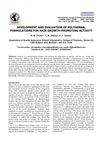 1 citations,
January 2005 in “Acta dermato-venereologica”
1 citations,
January 2005 in “Acta dermato-venereologica” The document recommends three dermatology books for their valuable content on evidence-based medicine, comprehensive treatment descriptions, and updated information on hair and scalp disorders.
 15 citations,
September 2016 in “Hair transplant forum international”
15 citations,
September 2016 in “Hair transplant forum international” The "open punch" technique for hair transplantation can help reduce damage to hair grafts and may be especially useful for beginners and in cases with curly hair.
 8 citations,
March 2006 in “Seminars in Cutaneous Medicine and Surgery”
8 citations,
March 2006 in “Seminars in Cutaneous Medicine and Surgery” Hair transplantation has improved to look more natural, but managing patient expectations and using precise techniques are key for the best outcomes.
 February 2025 in “Healthcare”
February 2025 in “Healthcare” Caffeine may help with hair loss, but more research is needed.
 July 2024 in “Applied Sciences”
July 2024 in “Applied Sciences” Bimatoprost is more effective than sweet almond oil for enhancing eyebrow growth.
 9 citations,
January 2009 in “International Journal of PharmTech Research”
9 citations,
January 2009 in “International Journal of PharmTech Research” The polyherbal oil with Eclipta alba, Hibiscus rosa sinensis, and Nardostachys jatamansi was found to be highly effective in promoting hair growth, better than minoxidil.
 January 2019 in “Research Square (Research Square)”
January 2019 in “Research Square (Research Square)” The trial will test if YH0618 granule prevents hair loss in breast cancer patients during chemotherapy.
 8 citations,
February 2022 in “Journal of Clinical Medicine”
8 citations,
February 2022 in “Journal of Clinical Medicine” Many COVID-19 patients experience temporary hair loss after infection, not linked to infection severity or treatment.
 9 citations,
May 2005 in “Facial plastic surgery”
9 citations,
May 2005 in “Facial plastic surgery” Laser hair removal can be safe and effective for dark-skinned individuals with the right laser settings.
 86 citations,
February 2003 in “Journal of The American Academy of Dermatology”
86 citations,
February 2003 in “Journal of The American Academy of Dermatology” New methods improve how we test hair growth treatments, but challenges like slow hair changes and high costs remain.
 September 2023 in “Irish Journal of Medical Science (1971 -)”
September 2023 in “Irish Journal of Medical Science (1971 -)” About 61% of women who had COVID-19 experienced hair loss afterward.
 2 citations,
July 2023 in “Life”
2 citations,
July 2023 in “Life” COVID-19 can cause temporary hair loss, which is commonly reversible with treatment.
 January 2023 in “Journal of pharmacognosy and phytochemistry”
January 2023 in “Journal of pharmacognosy and phytochemistry” Herbal home remedies can effectively treat hair loss with fewer side effects.
 5 citations,
November 2006 in “Dermatologic Surgery”
5 citations,
November 2006 in “Dermatologic Surgery” Hair transplant surgery is a good cosmetic solution for people with little or no pubic hair, especially to boost their self-esteem.
 8 citations,
January 1998 in “Journal of Cutaneous Medicine and Surgery”
8 citations,
January 1998 in “Journal of Cutaneous Medicine and Surgery” Hair transplantation is effective for baldness, with new methods improving results, but staying updated is crucial for patient outcomes.
 1 citations,
September 2017 in “Asian Journal of Pharmaceutical and Clinical Research”
1 citations,
September 2017 in “Asian Journal of Pharmaceutical and Clinical Research” Warfarin can rarely cause hair loss, which is usually reversible.
 July 2024 in “International Journal of Molecular Sciences”
July 2024 in “International Journal of Molecular Sciences” Hemp seed biomaterials may reduce hair loss and improve hair growth.
 July 2018 in “Elsevier eBooks”
July 2018 in “Elsevier eBooks” Some drugs can cause reversible hair loss, but certain chemotherapy drugs may lead to permanent hair loss; drugs can also change hair color and texture.
 5 citations,
November 2006 in “Dermatologic Surgery”
5 citations,
November 2006 in “Dermatologic Surgery” Pubic hair transplant surgery is an effective and permanent treatment for pubic hair loss.
 8 citations,
April 2015 in “Expert Review of Gastroenterology & Hepatology”
8 citations,
April 2015 in “Expert Review of Gastroenterology & Hepatology” Effective symptom management in IBD improves quality of life and prevents complications.
 29 citations,
October 2012 in “Anais Brasileiros De Dermatologia”
29 citations,
October 2012 in “Anais Brasileiros De Dermatologia” Diagnosing hair loss disorders needs clinical, dermoscopic, and histological differences, and checking menstrual cycle, weight changes, drug therapy, and nail changes.
 February 2024 in “Plastic and Reconstructive Surgery – Global Open”
February 2024 in “Plastic and Reconstructive Surgery – Global Open” Stem cell therapies show promise for hair regrowth in androgenetic alopecia.
 January 2024 in “Современные проблемы науки и образования (Modern Problems of Science and Education)”
January 2024 in “Современные проблемы науки и образования (Modern Problems of Science and Education)” Treating post-COVID hair loss leads to full recovery, while not treating it often results in ongoing symptoms.
 12 citations,
May 2019 in “The journal of pharmacology and experimental therapeutics/The Journal of pharmacology and experimental therapeutics”
12 citations,
May 2019 in “The journal of pharmacology and experimental therapeutics/The Journal of pharmacology and experimental therapeutics” Activating TRPV3 channels stops hair growth by killing hair follicle cells.
 April 2024 in “Nigerian Postgraduate Medical Journal”
April 2024 in “Nigerian Postgraduate Medical Journal” Androgenetic alopecia is a common hair loss condition influenced by various factors and linked to psychosocial and cardiovascular issues.
 18 citations,
January 2016 in “Elsevier eBooks”
18 citations,
January 2016 in “Elsevier eBooks” Nanotechnology improves cosmetics' effectiveness and safety.
 45 citations,
August 2019 in “Dermatologic Therapy”
45 citations,
August 2019 in “Dermatologic Therapy” Hair loss treatments work better with lifestyle changes.
 25 citations,
August 2021 in “Irish Journal of Medical Science (1971 -)”
25 citations,
August 2021 in “Irish Journal of Medical Science (1971 -)” COVID-19 infection can significantly cause temporary hair loss.
 39 citations,
August 2021 in “JAAD International”
39 citations,
August 2021 in “JAAD International” COVID-19 patients often experience hair loss and scalp pain, which may be related to the severity of their infection and treatment drugs.
 35 citations,
November 2020 in “Dermatologic Therapy”
35 citations,
November 2020 in “Dermatologic Therapy” Severe COVID-19 may cause hair loss, and doctors recommend supplements and topical treatments to manage it.






























